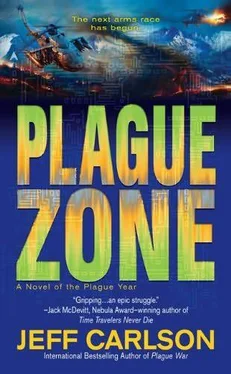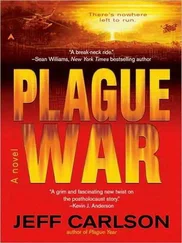Deborah’s efforts might have delayed the plague just long enough to preserve this hallway and most of her command. But as she regained her feet, she turned her back on Emma’s shaken eyes and stared at the blank surface of the door instead. They were safe.
They were safe, and it hurt.
“Deborah?” her friend asked.
Why wasn’t there anything on the intercom? she wondered. Then, angrily, What if I’d listened to Mendelson?
Her team had lost contact with the command center when they ran for the hallway. Would things have been different if she’d waited five minutes? Her team could have abandoned the other room instead of trying to hold that door, and then the engineers would have arrived before anyone else died.
Deborah’s breath returned at last. Her chest loosened and she gasped inside her face mask, hurrying away from the engineers. Their welder hissed to life. Everyone else winced at the incandescent blue light. Deborah did not, striding purposefully through the hallway to turn herself in to General Caruso.
“Let’s go! Move!” she said.
A few of her people had gone through the far door, but the others either seemed to be in shock or were collecting papers from the floor. A Navy officer said, “These are the Russian SITREPs from—”
“Move!” Deborah barked, shoving past him.
She hated to cry, but each inhalation was cathartic and sweet even as she shuddered with tears, trying to hide her face with her arm. As a member of the last crew aboard the International Space Station, as a physician and an infantry officer, Deborah Reece had seen more death than she could truly understand, but she had never killed before.
Deborah had spent the plague year in low Earth orbit, watching from the ISS as the world’s cities went dark and stayed dark. The ISS circled the planet every ninety minutes, and, on the nightside of the globe, prehistoric blackness covered every part of the world except for a very few strong-holds that burned like weak, fading stars. Leadville. Fuji. Kathmandu.
Her job had been to monitor and maintain the health of the crew. That she became rivals with Ruth Goldman was incidental. For one thing, they were the only two women aboard, and Deborah was the first to find comfort in the arms of their pilot, Derek Mills, whereas Ruth never did resolve her quiet attraction with Commander Ulinov.
The larger challenge was that while Deborah was intelligent, like all of NASA’s people, Ruth’s genius could make her difficult to reach. Ruth probably had forty IQ points on any of them, and, in her mania to reverse the plague, she exhausted herself and let her moods carry her for days on end. Her jokes were as deft as a scalpel. She cut everyone without trying.
Deborah was unlike Ruth in another way. She lacked Ruth’s imagination, which seemed to her to be a good thing. She thought if people were too smart, they lost sight of how to be normal or never understood the basics of social behavior in the first place. As long as she’d known her, Ruth had been a polarizing figure, either drawing people to her or repelling them. Like Deborah, some people had both reactions at once, binding themselves to Ruth but unable to personally identify with her intensity.
Deborah wanted to be friends. They took some steps in that direction. Then Ruth cut her even more deeply. When the ISS crew returned to Earth, it was on a highway too narrow for the shuttle. The Endeavour went off the road, killing Derek and injuring most of the rest. Ruth was needed in the nanotech labs — but eight days later she disappeared, joining the conspiracy to hijack the mission into Sacramento, California, where they’d hoped to recover the original designs of the machine plague.
Deborah never expected to see her again. When she did, she was thankful just to find a familiar face. It had taken no less than two miracles to bring them back together. Deborah was not surprised that Ruth had the tenacity to walk all the way from Sacramento to the edges of the Nevada desert, yet somehow she’d also evaded the enemy landings in California. More unlikely, Deborah herself drove out of Leadville only days before the bombing. Ruth’s would-be lover, Nikola Ulinov, was also a top Russian diplomat and a friend of Deborah’s. Playing upon the authority he’d long held aboard the ISS, he urged Deborah to make something of herself again.
U.S. Command was only too happy to add a physician to their ranks when Deborah volunteered. Even without military training, she had been handed the rank of captain, able to give orders yet equally bound by directives from above. It was a neat trick. Deborah didn’t mind. She thought Ulinov was right, and she knew she could handle herself even in a combat zone.
That was exactly where they sent her, even if she was a celebrity. Maybe they did it because of the small glamour of being associated with the space station, and if her status was some help to morale, all the better. Deborah was attached to an artillery company on the thin line of Leadville’s northern border. She felt some guilt for leaving the other survivors of the ISS crew, but Bill Wallace had been recovering nicely, and Gustavo and Ulinov were both deeply involved with the highest levels of the American government.
Now they were all dead.
Ulinov had saved her even before himself. It was a debt she couldn’t reconcile. She hated him for his part in the bombing, and yet she respected his loyalty and his self-sacrifice. He was a good man. He was just on the other side. Ultimately, the bombing had even caused some good. At the edge of the blast zone, beneath a stifling, radioactive haze, Deborah’s unit had surrendered to the nearest rebel command. Later, people said there had been thousands of acts of unity everywhere as U.S. and Canadian forces turned to face the invasion together. The truth was that Deborah’s company only wanted to run from the fallout without needing to fight through rebel lines. In fact, her people hiked ninety miles north before they learned what was happening in California.
Once more, Deborah’s training as a physician brought her straight into the middle echelons of their leadership in Grand Lake. It wasn’t what she wanted. She had only been with the men and women of her unit for most of a week, but when the sky ripped open, those soldiers became the only people she knew in the world. Yet she was under orders. Deborah had to believe that Grand Lake knew where she could do the most good — and they were right.
Ruth was rescued from an airfield in Nevada and brought back to the Rockies. Deborah, with Emma, found herself working alongside Ruth again. For the first time, Deborah was glad. Ruth had changed. She was more open. They needed each other.
One of Deborah’s tasks had been to organize blood samples from thousands of soldiers and civilian refugees after Ruth discovered a new kind of nanotech inside them, a nanotech that shouldn’t exist. Leadville had been testing several prototypes on its own troops, and Deborah chose to serve again when Ruth left Grand Lake, joining an elite military escort meant to aide and protect her. Ruth thought their best chance was to recover every fragment of Leadville’s work that the survivors of the bombing must be carrying in their blood.
Unfortunately, many of those refugees were starving and sick and terrified. Chinese aircraft ruled the skies. Soon enough, Chinese armored units rolled into the foothills of the Rockies — and Ruth betrayed her own people again, threatening both sides with the parasite. Deborah still didn’t know how to feel about what she’d done. Yes, Ruth’s plan had worked, bringing the war to a standstill, but only at the cost of exiling herself. Worse, she’d given the West Coast to the enemy when she might have decimated them instead.
Читать дальше












